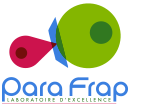-
PARAFRAP
- Qui sommes-nous
- Objectifs du Labex
- Laboratoires de recherches
- Coordinateurs
- Collaborateurs industriels
- Tutelles et soutiens
- GOUVERNANCE
- Organisation
- Comité de pilotage
- Comité exécutif
- Conseil scientifique international
- Comité Institutionnel
- FORMATION
- CONFERENCES
- THÉMATIQUES
- Exploitation des données post génomiques
- Mécanisme de la pathogénie
- Biologie Cellulaire et Moléculaire
- Nouvelles stratégies d'interventions thérapeutiques
- Plateformes
- VALORISATION
-
PARAFRAP
- Qui sommes-nous
- Objectifs du Labex
- Laboratoires de recherches
- Coordinateurs
- Collaborateurs industriels
- Tutelles et soutiens
- GOUVERNANCE
- Organisation
- Comité de pilotage
- Comité exécutif
- Conseil scientifique international
- Comité Institutionnel
- FORMATION

Cyrille BOTTÉ
Information

Institute of Advanced Biosciences 
Apicolipid: Membrane biogenesis, lipid synthesis and nutrient acquisition of Apicomplexan parasites and their human host cells 
Grenoble 
0000-0002-2245-536X 
Cette adresse e-mail est protégée contre les robots spammeurs. Vous devez activer le JavaScript pour la visualiser. 
https://iab.univ-grenoble-alpes.fr/ 
@ApicoLipid Scientific interests and projects
The research team I currently lead (https://NotAllowedScript69a74ecc280d1twitter.com/ApicoLipid @ApicoLipid) as CNRS Research Director focuses on understanding how Apicomplexan parasites acquire lipids and nutrient essential for their propagation and survival within their host cells.
Apicomplexa are unicellular eukaryotes and pathogenic agents responsible for major human diseases such as Toxoplasmosis, major chronic disease affecting ~1/3 of the world population and a lethal threat to immunocompromised patients, and (ii) malaria affecting 250 millions people/year, killing ~1/2million/year, mainly children. The renewal of our therapeutic arsenal needed for the eradication of these diseases depends on deciphering metabolic pathways that sustain parasite survival within the host and its environment.
Current evidences all point at lipid synthesis and membrane biogenesis as crucial pathways for parasite intracellular development.
Major biological questions remain and focus our current attention (i) how are lipids acquired, remodelled and trafficked from the host cell to the parasite and between parasite intracellular compartments? (ii) what is the input of scavenged vs de novo synthesised lipids? (iii) what are the mechanisms of lipid fluxing and trafficking from these two pathways? (iv) how does parasites sense and regulate these pathways to adapt to physiological changes of host nutritional and environmental conditions? (v) what are the parasite lipid signals required for intracellular development?
Our laboratory have set up major facilities and equipements that includes a P3* cell culture facility (MESRI-HCB), and a fully independent lipidomic-fluxomic platform encompassed within our P3* (http://gemeli-uga.fr/GEMELI.html), both parts of the core facilities of our Institution at the Université Grenoble Alpes. Our robust expertise and facilities thus allows us to conduct large metabolomics and lipidomics analyses beyond our central scope, on infectious diseases and other models, to determine metabolic signatures or monitoring metabolite fluxes. We currently lead major collaborative projects with national and international partners (LIA University Melbourne/WEHI, CEFIPRA ICGEB New Dehli…).
Top 5 publications of the last 5 years
1. Amiar S, Katris NJ, Berry L, Dass S, Shears MJ, Brunet C, Touquet B, McFadden GI, Yamaryo-Botté Y*, Botté CY*. (2019) Division and adaptation to host nutritional environment of apicomplexan parasites depend on apicoplast lipid metabolic plasticity and host organelles remodelling, Accepted in Cell Reports, (CELL-REPORTS-D-19-01152)
2. Dubois D, Fernandes S, Amiar S, Dass S, Katris NJ, Botté CY*, Yamaryo-Botté Y*. (2018)(*colast and corresponding) Toxoplasma gondii acetyl-CoA synthetase is involved in fatty acid elongation (of long fatty acid chains) during tachyzoite life stages. J Lipid Res. 59(6):994-1004
3. Shears MJ, MacRae JI, Goodman DG, Mollard VSU, Botté CY *, McFadden GI*. (2017) (*co-last) Characterization of the Plasmodium falciparum and P. berghei glycerol-3-phosphate acyltranferase involved in FASII fatty acid utilization in the malaria parasite apicoplast. Cellular Microbiology 19(1)
4. Amiar S, MacRae JI, Callahan DL, vanDooren GG, Shears MJ, Dubois D, Cesbron-Delauw MF, Maréchal E, McConville MJ, McFadden GI, Yamaryo-Botté Y*, Botté CY *. (2016) The Toxoplasma gondii apicoplast is responsible for bulk phospholipid synthesis mainly via a plantlike glycerol 3-phosphate acyltransferase for lysophosphatidic acid precursor assembly. Plos Pathogens 4;12(8):e1005765
5. Bullen H+, Jia Y+, Yamaryo-Botté Y, Klages J, Carruthers V, Botté CY, Soldati-Favre D. (2016) . Phosphatidic acid-mediated signaling is essential for microneme secretion in Toxoplasma. Cell Host and Microbe 9;19(3):349-60
mardi 24 février 2026Gordon Research Conference 2026 – Biology of Host–Parasite Interactions
Gordon Research Conference 2026 – Biology of Host–Parasite Interactions The 2026 Gordon Research Conference (GRC) on Biology of Host–Parasite Interactions will take place June 7–12, 2026, at Salve Regina University, in...
lundi 9 février 2026INSERM Workshop: Modern Methods in Molecular Parasitology (Montpellier, 4–6 November 2026)
The INSERM workshop “Modern methods in molecular parasitology” will take place in Montpellier, France, from 4–6 November 2026. This event will bring together leading experts in...
lundi 9 février 202615th CAPF (the French Anti-Parasitic and Anti-Fungal Consortium) workshop , March 16-17, 2026
The 15th CAPF (French Anti-Parasitic and Anti-Fungal Consortium) workshop will take place on 16–17 March 2026 in Strasbourg (France). This event is an excellent opportunity for students and postdoctoral researchers to participate and contribute...
mardi 20 janvier 2026Call for Applications: New Junior Research Groups at Institut Pasteur
Call for Applications: New Junior Research Groups at Institut Pasteur The Institut Pasteur has launched an international call to recruit new junior group leaders.This is a unique opportunity for high-potential scientists to...
lundi 12 janvier 2026Ingénieur·e d’étude / Research Engineer – Mosquito Immunity (IBMC, Strasbourg)
JOB : Ingénieur·e d’étude / Research Engineer – Mosquito Immunity (IBMC, Strasbourg) 🇫🇷 Le laboratoire Mosquito Immune Responses recrute un·e ingénieur·e d’étude à l’IBMC (Strasbourg). La personne recrutée sera en...
mardi 6 janvier 2026Applications Open for the Biology of Parasitism Course 2026
Applications are now open for the 2026 Biology of Parasitism (BoP) course, taking place June 12–July 23, 2026 at the Marine Biological Laboratory in Woods Hole, MA.This intensive 6-week program offers PhD students and postdocs advanced training in...
jeudi 27 novembre 2025Research Assistant/Associate Position | Molecular Parasitology | Newcastle University
Newcastle University offers a full-time, fixed-term position (3 years) for a Research Assistant or Research Associate in Molecular Parasitology — funded by the Medical Research Council (MRC). About the Opportunity Location:...
jeudi 13 novembre 2025PhD Opportunity | African Trypanosomes | University of York
Multidisciplinary PhD opportunity in the fields of infectious diseases, gene regulations and molecular signalisation. Fully Funded 4-Year PhD at the University of York A fully funded PhD opportunity is available at the...
mardi 14 octobre 2025Recap of the EMBO Workshop 2025
The EMBO Workshop 2025 “Host–Parasite Relationship: From Mechanisms to Control Strategies”, took place from October 5–8, 2025, on the beautiful Île des Embiez (France). Organized within the framework of the LabEx ParaFrap and...
jeudi 31 juillet 2025PostDoc l Toxoplasma l Montpellier, FR
Postdoc (M/F) in molecular and biochemical parasitology (Toxoplasma gondii) A 24-month post-doctoral position starting on January 2026 and funded by the French National Research Agency (ANR) is available in the in the...
Bluesky feed
PROGRAMME DE FORMATION FR
Programme Doctoral InternationalProgramme Post-doctoralACTUALITÉS
© 2023. Tous droits réservés by MLCOM
Notre site LabEx ParaFrap utilise des cookies pour réaliser des statistiques de visites, partager des contenus sur les réseaux sociaux et améliorer votre expérience. En refusant les cookies, certains services seront amenés à ne pas fonctionner correctement. Nous conservons votre choix pendant 30 jours. Vous pouvez changer d'avis en cliquant sur le bouton 'Cookies' en bas à gauche de chaque page de notre site. En savoir plus
Paramétrages de cookies
×Cookies fonctionnels
Ce site utilise des cookies pour assurer son bon fonctionnement et ne peuvent pas être désactivés de nos systèmes. Nous ne les utilisons pas à des fins publicitaires. Si ces cookies sont bloqués, certaines parties du site ne pourront pas fonctionner.
Mesure d'audience
Ce site utilise des cookies de mesure et d’analyse d’audience, tels que Google Analytics et Google Ads, afin d’évaluer et d’améliorer notre site internet.
- Google Analytics
- Google Ads
Contenus interactifs
Ce site utilise des composants tiers, tels que NotAllowedScript69a74ecc27aadReCAPTCHA, Google NotAllowedScript69a74ecc27778Maps, MailChimp ou Calameo, qui peuvent déposer des cookies sur votre machine. Si vous décider de bloquer un composant, le contenu ne s’affichera pas
- Google Maps
Pour en savoir plus, cliquez sur le lien.
Voir le site officiel - Calameo
Pour en savoir plus, cliquez sur le lien.
Voir le site officiel - reCaptcha V2
Pour en savoir plus, cliquez sur le lien.
Voir le site officiel - reCaptcha V3
Pour en savoir plus, cliquez sur le lien.
Voir le site officiel
Réseaux sociaux/Vidéos
Des plug-ins de réseaux sociaux et de vidéos, qui exploitent des cookies, sont présents sur ce site web. Ils permettent d’améliorer la convivialité et la promotion du site grâce à différentes interactions sociales.
- Twitter
Pour en savoir plus, cliquez sur le lien.
Voir le site officiel
Session
Veuillez vous connecter pour voir vos activités!Autres cookies
Ce site web utilise un certain nombre de cookies pour gérer, par exemple, les sessions utilisateurs.




